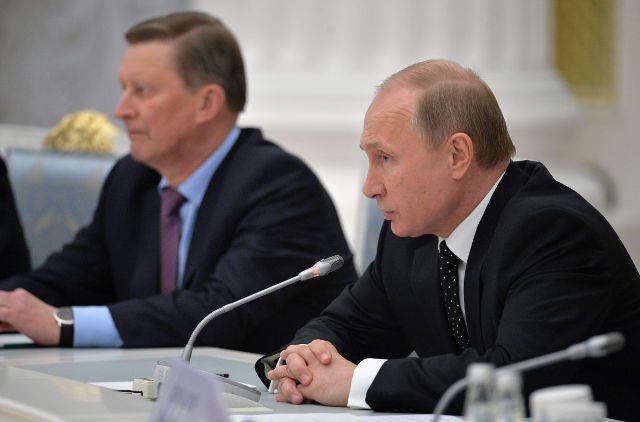SUMMARY
This is AI generated summarization, which may have errors. For context, always refer to the full article.

KIEV, Ukraine – Russia accused the West on Saturday, December 20, of stoking unrest in Ukraine by adopting anti-Kremlin sanctions that further erode the prospect of peace talks to end the separatist war.
A Ukrainian conference mediated by European and Russian envoys in the Belarussian capital Minsk had initially been set for last week and timed to coincide with a new truce in the eight-month conflict.
The ceasefire appears to be holding better than similar previous measures and the number of daily rocket and mortar attacks across the Russian-speaking eastern regions of Lugansk and Donetsk has gone down.
But Ukrainian forces still reported the loss of 5 soldiers Friday and have seen 15 servicemen killed since the December 9 deal.
The sudden glimmer of hope that the end of Europe’s worst violence since the 1990s Balkans conflicts was approaching has seen Western allies step up their pressure on Russia, already reeling from its worst economic crisis of Vladimir Putin’s 15-year rule.
The United States matched a similar measure by the European Union by slapping a trade ban on Kremlin-controlled Crimea.
Canada went a step further by also targeting Russia’s vital oil and gas industry.
Moscow resolutely denies backing the rebels and brands all steps against it as an effort to either topple Putin or weaken Russia’s military and industrial might.
“Of course, no one will be able to intimidate us, or contain and isolate Russia,” Putin told a Kremlin ceremony marking Russia’s national security services day.
“No one has ever been able to and no one ever will,” the Russian leader and one-time Soviet spy said.
And the foreign ministry called the thirteenth wave of Western sanctions against it a dangerous step that only hardens the guerrillas’ resolve.
“We advise Washington and Ottawa to think about the consequences of such actions,” the Russian ministry said in a statement.
The Black Sea peninsula declared independence in March after being overrun by Russian soldiers who wore unmarked uniforms and denied being sent by Moscow.
Putin brushes off charges of using the same tactics to split off Ukraine’s industrial heartland from Kiev to avenge the ousting in February of a Moscow-backed president.
But the Kremlin chief – overwhelmingly popular at home and increasingly isolated abroad – has gained little international recognition of Russia’s expanded borders.
Crimea on Saturday hosted its first foreign dignitary – Zimbabwean Environment Minister Saviour Kasukuwere.
Belarus strongman steps in
Poroshenko on Saturday confirmed to members of his powerful National Security and Defence Council plans to boost military spending to five percent of gross domestic product from its current one percent.
He conceded that the eastern campaign was costing Ukraine’s threadbare state coffers $6.3 million a day. Yet he also argued that “defense is something on which we have no right to scrimp” at a time when the country’s sovereignty was in peril.
The emergency meeting came a day before Belarussian President Alexander Lukashenko pays his first visit to Kiev since his neighbour’s historic shift toward the West.
The authoritarian Lukashenko has emerged as an unlikely peacemaker thanks to his ability to avoid picking sides in the conflict and his relatively strong standing with both the separatists and Kiev.
The timing of Lukashenko’s visit signals that the peace talks are unlikely to take place on Sunday as both Poroshenko and his European supporters had hoped.
Several rebel commanders have said they would not be ready until at least Monday or Tuesday. A Skype video conference between the sides Friday failed to resolve the dispute.
German Chancellor Angela Merkel, and more recently French President Francois Hollande, have been spearheading Western efforts to get the sides talking while Washington plays a backseat role.
Both leaders are this weekend expected to hold their third teleconference with Putin and Poroshenko in the space of a week.
The Minsk meeting appears to be hung up over Poroshenko’s refusal to discuss one of the separatists’ main demands — that he resume the social welfare payments to the war-torn region that Kiev suspended last month.
Poroshenko argues that the money is being stolen by the insurgents and used to pay guerrillas and foreign mercenaries.
“Kiev is doing everything possible to avoid holding the talks,” rebel negotiator Denis Pushilin said by telephone.
The militias’ inability to improve life in the socially devastated region threatens to turn the locals against them and undermine their claims of legitimacy. – Rappler.com
Add a comment
How does this make you feel?
There are no comments yet. Add your comment to start the conversation.